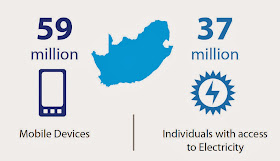By Dr.
Jon Moore, Director of Communications, Intelligent Energy
There is no question; mobile devices
are now integral to our daily lives. They are also an essential cog in the economic
machinery of individuals and businesses throughout the world. This is
especially pronounced in developing economies where mobile has transformed the
way consumers and businesses operate, indeed increases
in the use of mobile telephony are directly related to increased economic
growth. Only this week,
the GSMA
reported that the mobile ecosystem directly supported
3.3 million jobs and contributed US $21 billion to public funding in the sub-Saharan
Africa and is set to double its economic effect by 2020.
With the exciting launch
of the Mxit 7 social media app, LTE mobile
Internet and m-payments topping the agenda at AfricaCom,
it is all too easy to forget that even in South Africa the most important daily
function of the mobile phone is for making calls – whether calling family,
friends, or conducting the essential transactions that keep businesses growing.
But, take away the power for mobile
devices and suddenly our connected world falls into disarray. The mobile world
and all that it enables lasts only as long as its batteries!
There was a time, not so long ago before
apps, Internet and super-resolution cameras when the deciding factor when
choosing a mobile phone was their talk-time. Today, our phones and other mobile
devices are getting smarter and more capable; and this means they are becoming
more power hungry which further increases the demand on their batteries.
It would be fair to say that
improvements in battery technology have not kept pace with the demands of
today’s mobile technology and habits. How often do you have to recharge your
phone in a typical working day for example? In fact, a study of South African
mobile users conducted by Intelligent Energy showed that 30.4% said “every day”
and 5.9% even charge several times a day.
Even if you have access to mains electricity,
it takes time to recharge and you may be competing with colleagues for power
outlets. In South Africa, 37m people have access to power, but following a boom
in device adoption, there are now 59m mobile devices. That’s a lot of
competition for a socket if you’re caught short on battery. We found that an
astonishing 83.5% of South African consumers are willing to pay to recharge
their phone when it loses power.
It is not acceptable that progress,
smarter working and economic growth are endangered because of battery
limitations. Quite simply, ways have to be found to put more energy into
people’s hands. We can’t afford to wait for a breakthrough in battery
technology which may never happen, so what is to be done? Fortunately there is
an answer, and it comes in the form of hydrogen fuel cells.
Fuel cells, such as those being
commerclialised by Intelligent Energy and our partners, are suitable for a
range of sectors. They are a highly efficient and clean way of generating
electricity, combining hydrogen with air to produce power with no polluting
emissions. A highly scalable technology,
they are being targeted at a wide range of applications, from cars, buses, and
motorbikes to back-up and distributed power generation and for providing power to
mobile devices.
At Intelligent Energy, we have been working
to bring fuel cell technology and its compelling attributes into the world of
consumer electronics. This came to fruition yesterday at AfricaCom when we
launched Upp, a
personal energy device, to charge and power USB-compatible portable electronic
devices, such as smartphones, feature phones, eReaders, tablets, portable
gaming consoles, as well as digital cameras.
With billions of USB devices used by
consumers worldwide, Upp delivers at least one week of charge even to the most
demanding, power-hungry smartphones, giving
mobile consumers the energy freedom and independence to stay connected for
longer. Now you can have your own personal and instant energy whenever and
wherever you need it, whether you’re at home, work or on the road.
This
year, we have carried out successful consumer
field deployments in region and are now in
the process of expanding and recruiting further mobile partners worldwide. We believe Upp is a real game changer for
Africa and we look forward to working with users and the mobile ecosystem to
give Africa freedom from the grid.
For more information please visit www.beupp.com,
and join the discussion on Twitter,
Instagram and YouTube.



No comments:
Post a Comment